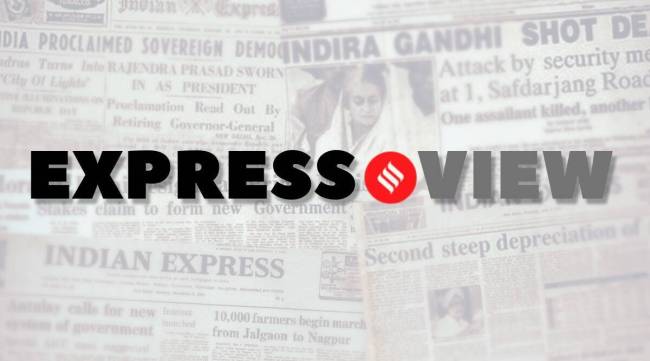Opinion Case related to NewsClick’s funding must take its course but UAPA, seizing devices, tagging 46 as ‘suspects’, is brazen short-circuiting of due process
Express View: While the case related to NewsClick’s funding must take its course, it must do so by giving primacy to due process. The state should not wrest more power to circumvent restraints under a stringent law that, in this matter, is clearly uncalled-for
 The chronology of the case against NewsClick -- it faces allegations of receiving illegal funding from China, routed through the United States -- underlines apprehensions of Police-ED being weaponised and a draconian law being deployed to intimidate a media organisation.
The chronology of the case against NewsClick -- it faces allegations of receiving illegal funding from China, routed through the United States -- underlines apprehensions of Police-ED being weaponised and a draconian law being deployed to intimidate a media organisation. This is how Delhi Police on Tuesday, at the end of a day-long search, seizure and questioning at more than 50 locations across the National Capital Region and Mumbai linked to NewsClick, framed it: “A total of 37 male suspects have been questioned… 09 female suspects have been questioned…” The language used for describing those linked to the news portal, including journalists, employees, even contributors, may be policespeak. But what it spelt out was chilling: The Unlawful Activities (Prevention) Act has been invoked against the news portal, whose editor-in-chief Prabir Purkayastha and head of human resources Amit Chakravarty were also arrested Tuesday. And its ominous shadow hangs over many more. This is guilt presumed by association — it raises grave questions about press freedom, a crucial part of the citizens’ fundamental right to know. Moreover, seizing a citizen’s laptop and phone breaches several constitutionally guaranteed rights. The chronology of the case against NewsClick — it faces allegations of receiving illegal funding from China, routed through the United States — underlines apprehensions of Police-ED being weaponised and a draconian law being deployed to intimidate a media organisation.
An FIR was filed by the Economic Offences Wing of the police in August 2020 for alleged violation of FDI norms and other laws; the ED searched premises linked to NewsClick in February 2021; the Delhi High Court directed the ED not to take any coercive action against the outfit in June 2021. That protection was subsequently extended by the court — the matter is listed for hearing on October 9. Invoking the UAPA and the police action Tuesday is a flagrant attempt to cut through due process, and escape the checks built into it for protecting freedoms against a transgressing state. There are other disturbing straws in the wind. The high court felt compelled to note, more than once, that a copy of the Enforcement Case Information Report was not provided to NewsClick. In August 2021, the court asked why custodial interrogation was required in the case. And on Tuesday, more than one of the journalists questioned by the police said that they were asked about the coverage of Delhi riots, anti-CAA protests and farmers’ agitation — politically contentious issues, all, on which the government has questions to answer.
While the case related to NewsClick’s funding must take its course, it must do so by giving primacy to due process. The state should not brazenly wrest more power to circumvent restraints under a stringent law that, in this matter, is clearly uncalled-for — in which the general principles of criminal law are reversed, timelines are relaxed for filing chargesheets and bail is immensely more difficult. In April, in the MediaOne case, a bench headed by Chief Justice of India D Y Chandrachud, powerfully underlined why “national security claims cannot be made out of thin air,” and how the state using national security as a “tool” to deny citizens remedies is not compatible with the rule of law. The bench also flagged why the protection of critical views is vital to the health of the press. These words need to be recalled, those lines need to be redrawn. In a constitutional democracy, they are vital for the protection of fundamental freedoms of individuals and institutions — when the state comes knocking on the door, at midnight or, as in this case, early morning.



